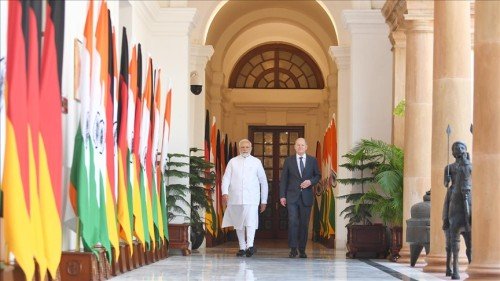
India and Germany share a long-standing relationship that dates back to the 19th century. Over the years, the two nations have strengthened their ties in various fields, including trade, education, culture, and diplomacy. Today, India and Germany are strategic partners, and their relationship is built on mutual respect and trust.
One of the key areas where India and Germany have a strong bond is in the field of trade. Germany is one of India's largest trading partners in Europe and the two nations have a bilateral trade agreement that promotes the exchange of goods and services. In 2020, the total bilateral trade between India and Germany was worth $19.4 billion. Some of the major items that India exports to Germany include textiles, chemicals, and pharmaceuticals, while Germany exports machinery, vehicles, and electrical equipment to India.
In the field of trade, India and Germany have a strong and diverse economic relationship. Germany is India's largest trading partner in the European Union, and India is Germany's second-largest trading partner in South Asia. The two nations have a bilateral trade agreement that provides a framework for the exchange of goods and services.
India and Germany have complementary economies, which makes for a mutually beneficial partnership. India is a growing market with a large and young population, while Germany is a global manufacturing and technology leader. This allows for trade in a wide range of goods and services, including automobiles, machinery, chemicals, pharmaceuticals, and textiles.
India has a competitive advantage in certain sectors, such as information technology and pharmaceuticals, while Germany is known for its high-quality manufacturing and engineering. This has led to joint ventures and partnerships between Indian and German companies in various fields.
In recent years, India and Germany have also collaborated on sustainable development and renewable energy. Germany is a leader in renewable energy technology, and India is investing heavily in clean energy to meet its growing energy needs. This has led to cooperation on various projects related to wind, solar, and hydro power.
Overall, the trade relationship between India and Germany is strong and continues to grow. Both nations are committed to expanding trade ties and exploring new areas of cooperation. As the global economy becomes more interconnected, India and Germany are well-positioned to benefit from their partnership and contribute to global economic growth.
Another important aspect of the relationship between India and Germany is cultural exchange. The two nations have a deep appreciation for each other's art, literature, and music. Many Indian students travel to Germany to pursue higher education, while German tourists visit India to explore its rich history and culture. The two nations have also collaborated on various cultural projects, such as film festivals and art exhibitions, to promote cross-cultural understanding and friendship.
Cultural exchange is an important aspect of the relationship between India and Germany. The two nations have a deep appreciation for each other's art, literature, and music, and have a long history of cultural exchange.
Indian culture has been influenced by German writers, philosophers, and artists. German literature and philosophy have been studied extensively in India, and many Indian universities offer courses on German culture and language. Similarly, Indian art, music, and dance have gained popularity in Germany, with many German artists and performers collaborating with their Indian counterparts.
The exchange of students and scholars between India and Germany is also an important aspect of cultural exchange. Many Indian students travel to Germany to pursue higher education, while German universities attract students from India for their quality education and research opportunities. This exchange of ideas and knowledge helps foster mutual understanding and friendship between the two nations.
India and Germany also collaborate on various cultural projects, such as film festivals, art exhibitions, and music concerts. These events provide a platform for Indian and German artists to showcase their talent and interact with each other, promoting cross-cultural understanding and friendship.
In recent years, the two nations have also collaborated on initiatives to promote the teaching of each other's languages. This includes the German-Indian Classroom program, which aims to connect Indian and German schools and promote language learning and cultural exchange among students.
Overall, cultural exchange between India and Germany is a vital aspect of their relationship, fostering mutual respect and understanding between the two nations. By promoting cultural exchange, India and Germany are building a stronger relationship based on shared values and interests.
In addition to trade and cultural exchange, India and Germany also collaborate on various scientific and technological projects. For example, the two nations have a joint research program in the field of renewable energy, which aims to develop innovative solutions for climate change. India and Germany have also worked together on space projects, such as the Mars Orbiter Mission and the Moon Mission, which have enhanced the scientific capabilities of both nations.
Overall, the relationship between India and Germany is based on shared values and interests. The two nations have a long history of cooperation and friendship, and their partnership continues to grow stronger with each passing year. As the world becomes more interconnected, India and Germany are poised to play a significant role in shaping the future of the global economy and society.








